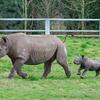Red squirrel babies, born 3 weeks ago, are now venturing out of their nest boxes. After maturing at the Wildwood Trust park they will be transported to two sites in Wales and released into the wild as part of Wildwood's red squirrel conservation project aimed at preventing their nationwide extinction by re-introducing red squirrels back to the UK. After efforts to reintroduce pine martens over the last 3 years by the Vincent Wildlife Trust, it is now hoped the red squirrel can out compete invasive grey squirrels from North America to once again become part of lives, eventually being restored across Southern Britain.
The distribution of red squirrels has declined drastically in the last 60 years and they are now extinct in southern England except for a few on the Isle of Wight and two small islands in Poole Harbour. The main cause of this decline is competition with the introduced American grey squirrel. The grey squirrel is larger than the red and better able to survive harsh weather and periods of food shortage. It breeds more successfully and quickly out-competes the red squirrel for food.
Peter Smith of Wildwood Trust's said: "Red squirrels are one of the most beautiful animals in the U.K. and visitors can watch these playful animals over the summer until they have grown up enough to be released to the wild. If we can help restore areas of woodland to a native state, reintroduce animals like Pine Martens to control invasive grey squirrels, we might just be able to tip the balance back in the Red Squirrel's favour. Our eventual plan is to once again see them back across Southern Britain.”
Wildwood is home to over 200 native animals including bears, wolves, bison, deer, owls, foxes, red squirrels, wild boar, lynx, wild horses, badgers and beavers. Wildwood Trust have taken part in many conservation programmes including saving the water vole, using wild horses to restore Kent's precious nature reserves, bringing the extinct European beaver back to Britain and returning the hazel dormouse and red squirrel to areas where they have been made extinct. You can watch a video of some of the babies born last year that have now been successfully reintroduced and are thriving in Wales.
Related Members
-
NewsBIAZA calls for native species projects for Great British Wildlife Restoration 26th July, 2024The Great British Wildlife Restoration Awards by the British and Irish Association of Zoos and Aquariums (BIAZA) is looking for Britain’s best zoo/aquarium…
-
News
 Rhino Conservation Success at Yorkshire Wildlife Park Resort 23rd July, 2024The birth of a rare Eastern Black Rhino at Yorkshire Wildlife Park has become the catalyst for a fund-raising campaign to help save the endangered species.…
Rhino Conservation Success at Yorkshire Wildlife Park Resort 23rd July, 2024The birth of a rare Eastern Black Rhino at Yorkshire Wildlife Park has become the catalyst for a fund-raising campaign to help save the endangered species.… -
News
 New Changing Places Facility Installed at Thrigby Hall Wildlife Gardens 19th July, 2024New Changing Places Facility Installed at Thrigby Hall Wildlife Gardens Thrigby Hall Wildlife Gardens are thrilled to announce the opening…
New Changing Places Facility Installed at Thrigby Hall Wildlife Gardens 19th July, 2024New Changing Places Facility Installed at Thrigby Hall Wildlife Gardens Thrigby Hall Wildlife Gardens are thrilled to announce the opening…



